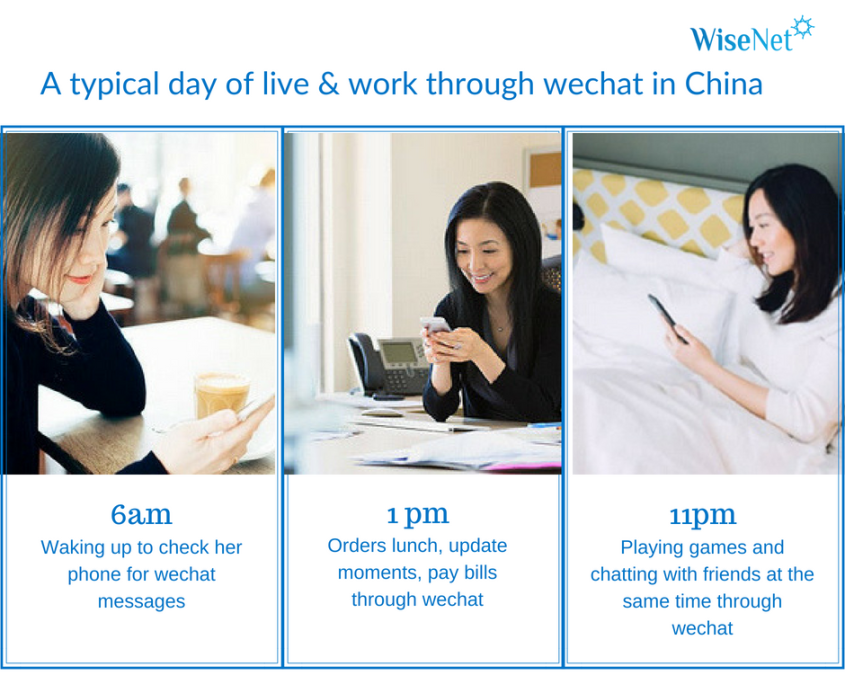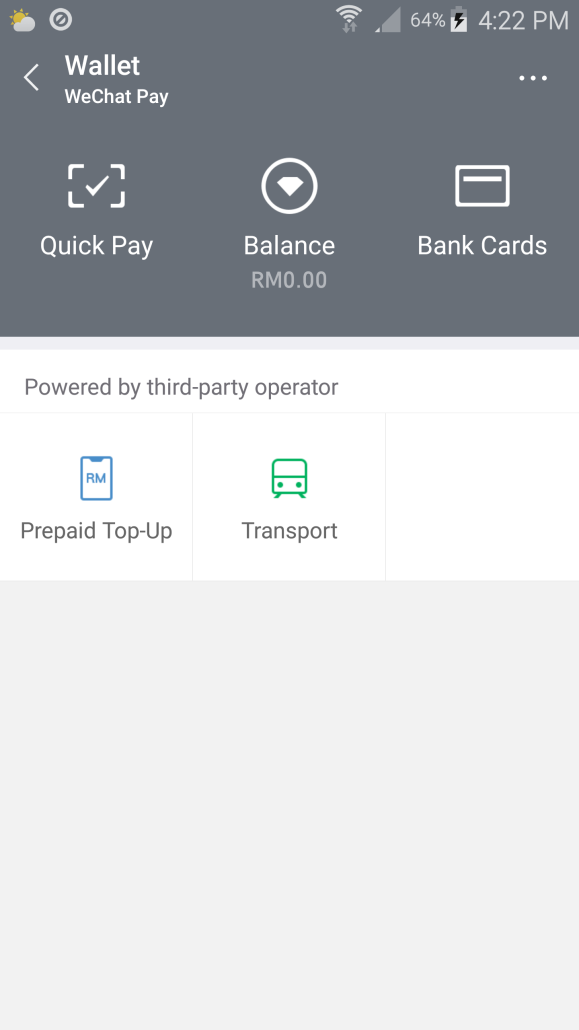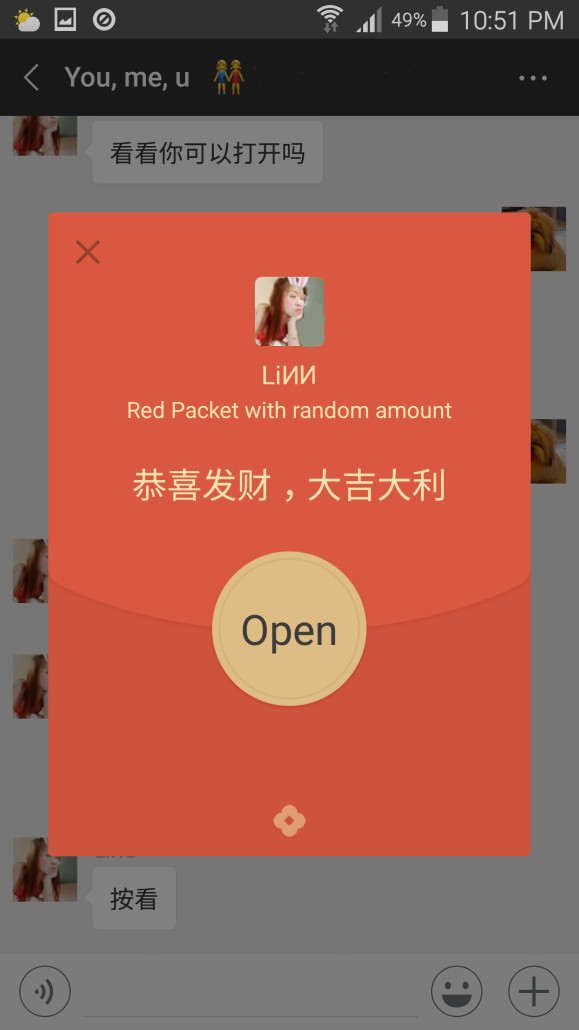WiseNetAsia Knowledge Center
Copyright © 2018 WiseNet Asia Pte Ltd. All Rights Reserved
WeChat is part of daily lives
With a working population of approximately 774.51 million, China’s tremendous growth cannot be understated.[1] This is largely driven by the juggernaut of constantly evolving technology, in the form of trends and companies that play significant roles in shaping how people consume news and media, discover and make purchases, communicate with others, conduct financial transactions and more.
A typical day of an office worker in China might start off by waking up to scroll and check her phone for new messages and notifications. On the way to work, she might shop at her favourite brand and buy the dress she has been thinking about. With a busy day at work and no time to step out, she orders in some lunch and it’s delivered to the office as she sends moments to her family and pays some bills. That evening at dinner with friends, they all split the meal cost using the go-dutch feature. This is hassle-free and immediate. As she winds down before bed, watches a drama series while double screening – looking up new trends, playing games and chatting with friends at the same time. Every single item above can be done on WeChat.

WeChat’s user base almost touched 1 billion as of 2017, and the app has almost entirely replaced physical wallets for the Chinese.[2] WeChat forms the equivalent of WhatsApp, and also encompasses all the social media networks permitted in China, offers different channels for people to keep in touch with one another, facilitates banking transactions quickly and securely, and incorporates numerous lifestyle, retail, travel and restaurant options.

Picture above: Buying a bus ticket through WeChat
Tencent and its ambition for the world
Tencent, who’s behind WeChat ranks globally in the latest technologies spanning social, retail and finance, is a staple name in the daily lives of people in China.
WeChat permeates even the field of work, as it is the uniform platform for communication for most companies in China. It has comprehensive functions such as file sharing, group discussions and company updates via Moments. This makes it a direct competitor for Weibo, a wildly popular social media platform (an equivalent of Facebook, if you would) launched two years before WeChat.
WeChat Moments also provide opportunities for local advertising. Launched in November 2016, this allows brands to market and promote their activities – all within the app. This integration really changes the game for marketers as they reach a wide base of customers whose lives revolve around usage of the WeChat app.
From a global perspective, WeChat’s strategy in Europe interestingly does not target on acquiring new users. It looks at advocating WeChat’s financial transaction and marketing capabilities to enhance the connectivity and reach of various businesses to Chinese consumers. This comes as the WeChat wallet expands its options to incorporate ride hailing services, shopping and retail, books and movies and entertainment, travel and hotels, and more. It is also making use of artificial intelligence (AI) and exploring its potential with gaming as a start.
WeChat Pay revolutionizes the way payments are made. Being an e-wallet as part of such a comprehensive app that is central to everyday living, WeChat Pay presents rewarding wealth opportunities such as the provision of online loans and investments and financial management products.[3] For Tencent (and competitor Alipay in this regard), it has set its sights beyond China to bring this payment innovation worldwide. Businesses and merchants have welcomed this payment system, which makes sense with the sheer number of Chinese tourists everywhere, with their overseas tourism spending totalling a record $261 billion in 2016.[4]

Picture above: WeChat e-wallet
Sending each other ‘lucky money’ is another popular WeChat function, drawing on the tradition of exchanging red packets filled with cash during the Lunar New Year. Businesses can also use this as a promotional tool to offer customers various rewards when users shake their phones to reveal them.

Picture above: Lucky money sent with random amount
Impact on how we live, work and play
Having seamless comprehensive apps like WeChat means that people are reachable and contactable 24/7. This might further dilute the meaning of work-life balance and present a constant bombardment information, making people increasingly attached to their phones instead of paying attention to fellow friends and family in real time. It demonstrates how gadgets can ruin the appreciation of the basic things in life (such as having a good in-person conversation or watching the sun set) if a balance isn’t struck.
Our worldviews and prejudices are also very much shaped by the media we consume. Generation Z, in particular, almost entirely revolves around the digital world. A whopping 71% believe that what they do online will affect their future opportunities in career and life.[5] On the flipside, brands and companies are spending billions to build a strong and engaging presence on their socials to attract this vital crowd.
The ubiquity of the mobile phone means access to information for more people everywhere. The entry point is low: an internet search bar takes you places, and many physical locations are starting to use QR codes which can be scanned, leading users to a website. Companies are spending 75% of their digital allocation to mobile advertising, a testament to the sheer value of phone-wielding humans everywhere.[6]
Work processes are also dominated by mobile, specifically WeChat, in China. It provides collaborative working environments and convenient in-app communication channels. Employees can also follow their company’s official WeChat account for work updates. WeChat users in general can use WeChat’s wallet, play music and videos, and edit photos – do anything! – within the app.
However, there are also concerns around personal data and privacy. WeChat, for example, does not have end-to-end encryption and is monitored, as demonstrated by censored words during a period of criticism over Xi Jinping’s reign.[7]
The obsession with creating an online presence might also be unhealthy (think ‘Insta-perfect’ lives on Instagram), and there may be difficulty identifying people for who they are in real life based on their online profiles.
What this means for our future
This could mean less privacy, people being contactable all the time, being tracked through their location settings and online spending patterns. The extent of loss in individual privacy is more so in China where personal data protection act is not as strictly regulated as other regions. Anyone who is part of social media has the possibility of their digital footprint being exposed publicly, directly or indirectly. Digital footprint is built throughout the years whenever a photo is uploaded or when checking in somewhere for free wi-fi, or during data roaming.
In China and for Chinese overseas, WeChat is a system for living and working. It will continue to dominate as the platform that unifies individuals and companies. For businesses, it’s about how to navigate the WeChat dynamics and maximize its opportunities. This means being fast enough to tap on every new feature that is applicable, such as lucky money to encourage users’ loyalty and many more.
For individuals, perhaps the future isn’t so much about achieving work-life balance, especially in highly competitive China cities. It is about self-discipline to regularly unplug to avoid the negative impacts from too much social media consumption.
Sources:
[1] Source: https://www.statista.com/topics/1317/employment-in-china/
[2] Source: https://www.statista.com/statistics/255778/number-of-active-wechat-messenger-accounts/
[3]Source: https://www.forbes.com/sites/ywang/2017/12/06/how-chinas-tech-giants-alibaba-and-tencent-want-to-shape-how-the-world-pays/#69b9b098e6d0
[4]Source: https://www.forbes.com/sites/ywang/2017/12/06/how-chinas-tech-giants-alibaba-and-tencent-want-to-shape-how-the-world-pays/#69b9b098e6d0
[5]Source: https://www.techradar.com/news/is-your-website-ready-for-generation-z
[6]Source: https://www.forbes.com/sites/johnkoetsier/2018/02/23/mobile-advertising-will-drive-75-of-all-digital-ad-spend-in-2018-heres-whats-changing/#fe331b8758be
[7]Source: https://www.businessinsider.my/censored-words-in-china-xi-jinping-term-limits-2018-2/?r=US&IR=T; https://www.techinasia.com/outside-china-wechat-is-a-fish-out-of-water

